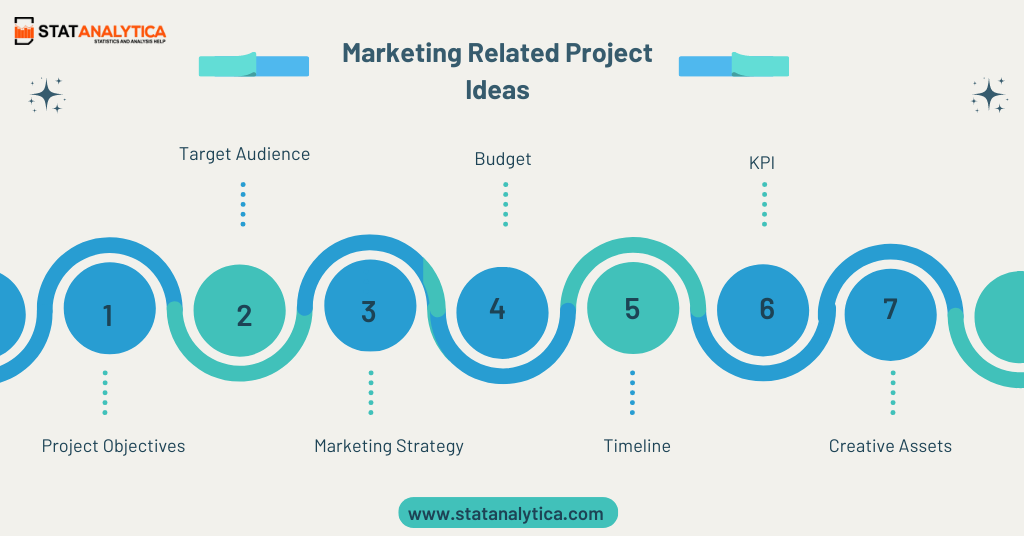Are you looking for marketing related project ideas, if so then you are at the right place. However, marketing is crucial to any business, whether a small start-up or a large corporation. Effective marketing strategies can help businesses reach new customers, increase brand awareness, and drive revenue growth. However, developing and executing successful marketing campaigns can be challenging with the ever-evolving landscape of consumer behaviour, technology, and competition.
This blog will explore 60+ marketing related project ideas that can be effective strategies for marketing success.
What is Marketing?
Table of Contents
Marketing refers to promoting and selling products or services to customers. It involves identifying customer needs and preferences, creating products or services that meet them, and promoting them effectively to reach the target audience.
Marketing encompasses various activities, including market research, product development, pricing, promotion, and distribution. It also involves developing and maintaining strong customer relationships and analyzing and adapting to changes in the marketplace and consumer behavior.
The ultimate goal of marketing is to generate revenue and profit for a business by satisfying customer needs and wants. Effective marketing strategies can help businesses increase their customer base, build brand loyalty, and achieve their objectives.
Role of Marketing Projects
A marketing project is crucial in helping businesses achieve their marketing goals. Marketing projects are typically designed to address a specific marketing challenge or opportunity, such as launching a new product, increasing brand awareness, or entering a new market.
Some of the key roles of a marketing project include:
1. Identifying Customer Needs And Preferences
A marketing project can help businesses gather information about their target audience, including their needs, preferences, and purchasing behavior. This information can be used to develop more effective marketing strategies and tactics.
2. Developing Marketing Strategies And Tactics
A marketing project can help businesses develop and implement effective marketing strategies and tactics, such as advertising, promotions, and social media campaigns. These strategies can help businesses reach their target audience and generate more leads and sales.
3. Measuring And Analyzing Marketing Performance
A marketing project can help businesses track and measure their marketing performance, including metrics such as website traffic, conversion rates, and customer engagement. This data can be used to refine marketing strategies and improve overall performance.
4. Building Brand Awareness And Loyalty
A marketing project can help businesses build brand awareness and loyalty among their target audience. By developing and implementing effective branding strategies, businesses can differentiate themselves from competitors and create a strong connection with their customers.
60+ Marketing Related Project Ideas: Every Marketer Must Know
Here in this section, we will tell you more than 60+ marketing related project ideas. Read all the marketing related project ideas if you want to become a good marketer.
1. Social Media Marketing Campaign
Develop a comprehensive marketing campaign targeting your ideal customer profile on platforms like Facebook, Twitter, and Instagram.
2. Email Marketing Campaign
Create an email marketing campaign that engages your subscribers with valuable content and promotions.
3. Influencer Marketing Campaign
Partner with influencers in your industry to promote your products or services to their followers.
4. Content Marketing Strategy
Develop a content marketing strategy that includes blog posts, videos, and other types of content to engage and educate your target audience.
5. Search Engine Optimization (Seo) Strategy
Improve your website’s visibility in search engine results by developing an SEO strategy that includes keyword research, on-page optimization, and link building.
6. Pay-Per-Click (Ppc) Advertising Campaign
Create a PPC advertising campaign on platforms like Google Ads or Bing Ads to drive traffic to your website and generate leads.
7. Customer Referral Program
Implement a customer referral program that incentivizes customers to refer their friends and family to your business.
8. Trade Show Participation
Participate in trade shows and other industry events to showcase your products or services and network with potential customers. Strategically selected marketing events provide unparalleled opportunities to increase visibility, generate leads and accelerate sales.
9. Product Launch Campaign
Develop a product launch campaign that builds excitement and anticipation for your new product or service.
10. Branding And Logo Design
Develop a new branding strategy and logo design that reflects your business’s values and mission.
11. Customer Retention Program
Create a loyalty program that rewards loyal customers and incentivizes them to continue doing business with you.
12. Mobile App Development
Develop a mobile app that makes it easier for customers to interact with your business and access your products or services.
13. Web Design And Development
Redesign your website to improve its usability, functionality, and aesthetics.
14. Social Media Advertising Campaign
Create a social media campaign on platforms like Facebook, Twitter, and LinkedIn to reach a broader audience.
15. Market Research
Conduct market research to understand your target audience’s needs, preferences, and purchasing behavior.
16. Customer Segmentation
Segment your customer base based on demographics, psychographics, or behavior to effectively target your marketing efforts.
17. Sales Funnel Optimization
Optimize your sales funnel to improve conversion rates and generate more revenue.
18. Customer Journey Mapping
Map out the customer journey to identify areas where you can improve the customer experience and drive more sales.
19. Video Marketing Campaign
Create a video marketing campaign that engages and educates your target audience through entertaining and informative videos.
20. Podcast Marketing Campaign
Launch a podcast that discusses topics related to your industry and promotes your products or services.
21. Event Marketing Campaign
Plan and execute an event marketing campaign that promotes your business and generates leads.
22. Loyalty Program
Implement a loyalty program that rewards repeat customers with exclusive perks and discounts.
23. Employee Advocacy Program
Encourage your employees to become brand ambassadors and promote your business on social media and other channels.
24. Public Relations Campaign
Develop a public relations campaign that generates positive media coverage and enhances your brand’s reputation.
25. User-Generated Content Campaign
Encourage your customers to create and share user-generated content that promotes your products or services.
26. Cross-Promotion Campaign
Partner with other businesses in your industry to cross-promote each other’s products or services.
27. Customer Feedback Program
Implement a customer feedback program that gathers and uses it to improve your products or services.
28. Affiliate Marketing Program
Partner with affiliate marketers who promote your products or services to their audiences in exchange for a commission.
29. Localization Strategy
Develop a localization strategy that tailors your marketing efforts to different geographic regions and cultures.
30. Website Personalization
Personalize your website’s content and user experience based on visitors’ browsing history, location, and other data points to increase engagement and conversion rates.
31. Chatbot Implementation
Implement a chatbot on your website or social media channels to provide quick and personalized customer support and answer frequently asked questions.
32. Customer Advocacy Program
Create a customer advocacy program that rewards loyal customers for promoting your business and referring new customers.
33. Community Building
Build an online or offline community around your brand or industry to foster engagement, loyalty, and advocacy.
34. Cause Marketing Campaign
Develop a cause marketing campaign that aligns your brand with a social or environmental cause and resonates with your target audience’s values.
35. Branded Content Partnership
Partner with publishers or other businesses to create branded content that provides value to your target audience and promotes your brand.
36. User Experience (Ux) Design
Improve your website or mobile app’s UX design to enhance usability, navigation, and user satisfaction.
37. Product Bundling And Upselling
Offer product bundles or upsell opportunities to increase your average order value and revenue per customer.
38. Interactive Content Marketing
Create interactive content such as quizzes, calculators, and games that engage and educate your target audience.
39. Customer Onboarding Program
Develop a customer onboarding program that provides new customers with a seamless and personalized experience and sets them up for success with your product or service.
40. Account-Based Marketing (ABM)
Implement an ABM strategy that targets high-value accounts or customers and delivers personalized marketing messages and experiences.
41. Virtual Reality Marketing Experience
Create an immersive VR experience that allows customers to interact with your products or services.
42. Augmented Reality Product Catalog
Develop an AR app that enables customers to visualize and try out your products in their own environment.
43. Gamification Campaign
Design a game-based marketing campaign where customers earn rewards or discounts by completing specific tasks or challenges.
44. Voice Search Optimization
Optimize your website and content for voice search queries to capture traffic from voice-enabled devices like smart speakers.
45. Personalized Packaging
Enhance customer experience by creating personalized packaging or adding custom messages to surprise and delight customers.
46. Micro-Moments Marketing
Identify key micro-moments in the customer journey and develop targeted campaigns or content to address those specific needs.
47. Geo-Targeted Campaigns
Use geolocation technology to deliver targeted ads or offers to customers based on their physical location.
48. Social Listening and Sentiment Analysis
Monitor social media platforms and online forums to gather insights about your target audience’s preferences, needs, and sentiment towards your brand.
49. Cause Marketing Campaign
Partner with a nonprofit organization or support a social cause, aligning your brand with a purpose and giving back to the community.
50. Interactive Live Webinars
Host live webinars where participants can ask questions, participate in polls, and engage in real-time discussions.
51. Subscription Box Service
Create a subscription box service that delivers curated products to customers on a regular basis, providing a unique and convenient shopping experience.
52. Data-Driven Personalization
Leverage customer data and behavior to deliver personalized marketing messages, offers, and recommendations.
53. Experiential Marketing Pop-up
Set up a temporary physical space where customers can experience your brand through interactive installations, workshops, or product demos.
54. Virtual Trade Show
Host a virtual trade show where businesses can showcase their products or services to a global audience.
55. Virtual Product Launch
Host a virtual event to unveil and showcase a new product, complete with interactive presentations, demos, and Q&A sessions.
56. Interactive Packaging
Incorporate interactive elements, such as free QR code or augmented reality, into your product packaging to provide additional content or a unique user experience.
57. Social Media Storytelling Campaign
Develop a series of engaging and compelling stories on social media platforms that highlight your brand values, mission, or behind-the-scenes content.
58. Branded Podcast
Create a podcast that focuses on topics related to your industry or niche, providing valuable insights and establishing your brand as a thought leader.
59. AI-powered Chatbot Marketing
Utilize artificial intelligence to develop advanced chatbots that can engage with customers, answer inquiries, and provide personalized recommendations.
60. Interactive Digital Signage
Use interactive digital signage in public spaces or events to capture attention, deliver targeted messages, and collect customer data.
61. Partnership with Local Artists or Designers
Collaborate with local artists or designers to create limited-edition or co-branded products that generate buzz and attract new customers.
Read More
Elements of Marketing Projects
Marketing projects typically involve several key elements, each important in achieving the project’s objectives. Here are some of the key elements of a marketing project:

1. Project Objectives
The objectives define what the marketing project intends to achieve. This may include increasing sales, improving brand awareness, launching a new product or service, or entering a new market.
2. Target Audience
The target audience refers to the people or businesses the marketing project intends to reach. Defining the target audience is essential to ensure the project’s messaging, branding, and tactics align with their needs and preferences.
3. Marketing Strategy
The marketing strategy outlines the project’s approach to achieve its objectives. This may include tactics such as advertising, public relations, social media marketing, email marketing, or content marketing.
4. Budget
The budget outlines the financial resources available to the project. This includes creative development, media buying, and other marketing expenses.
5. Timeline
The timeline outlines the project’s schedule and deadlines. This ensures the project stays on track and all tasks are completed on time.
6. Key Performance Indicators (KPIs)
KPIs measure the project’s success in achieving its objectives. This may include metrics such as website traffic, conversion rates, social media engagement, or customer acquisition costs.
7. Creative Assets
Creative assets refer to the visual and messaging components of the project, such as advertising copy, branding, and visual design. These assets are designed to capture the target audience’s attention and effectively communicate the project’s messaging.
Things to Consider While Doing Marketing Project
Creating a successful marketing project requires careful planning and execution. Here are some of the key things to consider while doing a marketing project:
1. Define Project Objectives
Before beginning any marketing project, it’s essential to define them clearly. This involves understanding what you want to achieve through the project and setting measurable goals aligning with your business objectives.
2. Know Your Target Audience
Understanding your target audience is critical to developing effective marketing strategies and tactics. Conduct market research to identify your ideal customer profile and tailor your messaging and tactics to resonate with their needs and preferences.
3. Develop A Comprehensive Marketing Strategy
Based on your project objectives and target audience, develop a comprehensive marketing strategy that outlines the tactics you’ll use to achieve your goals. Consider incorporating traditional and digital marketing tactics to reach your target audience effectively.
4. Set A Realistic Budget
Developing an effective marketing project requires a budget considering the costs of creative development, media buying, and other marketing expenses. Set a realistic budget that aligns with your business goals and resources.
5. Establish A Clear Timeline
Creating a marketing project involves multiple tasks that must be completed within a specific timeframe. Establish a clear timeline that outlines the project’s milestones and deadlines.
6. Monitor And Measure Performance
Track and measure the project’s performance against the established KPIs to identify what’s working and needs improvement. Regularly analyze the data and adjust your tactics to improve the project’s effectiveness.
7. Leverage Data And Insights
Incorporate data and insights into your marketing project to inform your decision-making and improve your outcomes. Use data to identify emerging trends and insights to refine your strategies and tactics.
Ways to Find Best Marketing Related Project Ideas
Here are some ways to find the best marketing related project ideas:
1. Conduct Market Research
Conduct market research to identify gaps in the market, unmet customer needs, and emerging trends. Use this information to brainstorm project ideas that address these gaps and needs.
2. Analyze Your Competition
Analyze your competition’s marketing strategies and identify areas where you can differentiate yourself. Use this information to generate project ideas that stand out from your competitors.
3. Engage With Your Audience
Engage with your audience on social media, email, or other channels to understand their needs, pain points, and preferences. Use this information to develop projects that address their needs and preferences.
4. Analyze Your Data
Analyze your marketing data to identify areas where you can improve your performance. For example, you may notice that your email open rates are low, indicating a need for a new email marketing campaign.
5. Look For Inspiration
Look for inspiration from other industries or brands that are doing innovative and successful marketing. Use this inspiration to generate new ideas that are relevant to your business.
6. Attend Industry Events
Attend industry events such as conferences, webinars, or workshops to learn about the latest trends and best practices. Use this knowledge to develop projects that leverage these trends and practices.
7. Brainstorm With Your Team
Brainstorm project ideas with your team to leverage their expertise and insights. Encourage an open and creative environment where everyone can contribute ideas.
Conclusion
This is the end of this post which is about marketing related project ideas. On the other hand, businesses can undertake countless marketing related project ideas to improve their marketing effectiveness and achieve success. By utilizing the right strategies and techniques, businesses can increase brand awareness, engage with their target audience, generate leads, and drive revenue. It is important to conduct thorough research, analyze data, and seek inspiration to generate the best marketing related project ideas for your business.
Additionally, implementing these projects requires careful planning, execution, and monitoring to ensure they achieve the desired results. By prioritizing marketing effectiveness and leveraging the power of innovative and creative marketing strategies, businesses can stay ahead of the competition and achieve long-term success.
FAQs
Q1. What are some creative marketing project ideas for small businesses?
a) Designing and implementing a guerrilla marketing campaign to create buzz and attract attention.
b) Creating and distributing personalized direct mail or email campaigns to targeted customer segments.
c) Organizing a local event or workshop to showcase products/services and engage with the community.
d) Collaborating with complementary businesses for cross-promotion and co-branded campaigns.
Q2. How can I leverage digital marketing for my project?
a) Utilize search engine optimization (SEO) techniques to improve website visibility and organic traffic.
b) Develop a content marketing strategy by creating valuable and relevant blog posts, videos, or infographics.
c) Run targeted online advertising campaigns on platforms such as Google Ads or social media platforms.
d) Leverage social media platforms to engage with customers, share content, and run promotional campaigns.
Q3. Are there any low-budget marketing project ideas for startups?
a) Utilise the power of social media marketing by creating compelling content and engaging with the audience.
b) Implement a customer referral program to incentivize existing customers to refer new ones.
c) Collaborate with local or micro-influencers who use your brand values and target audience.
d) Leverage email marketing by building a subscriber list and sending targeted, personalized emails to customers.

